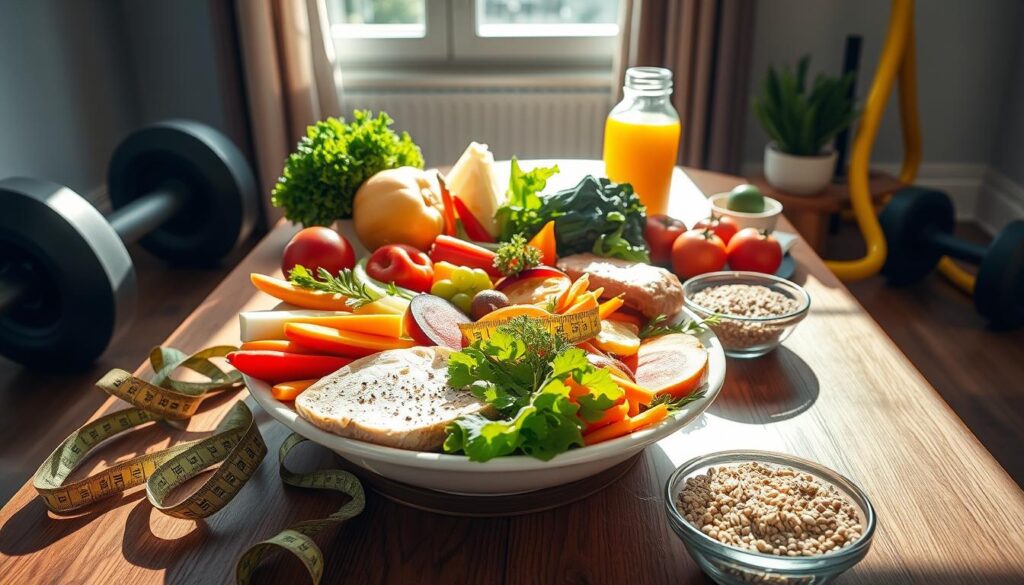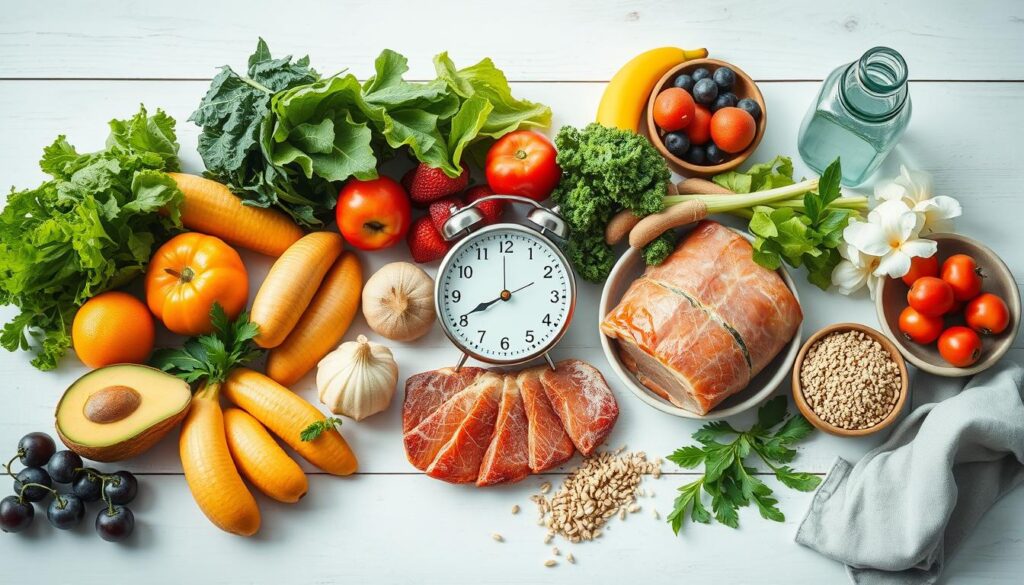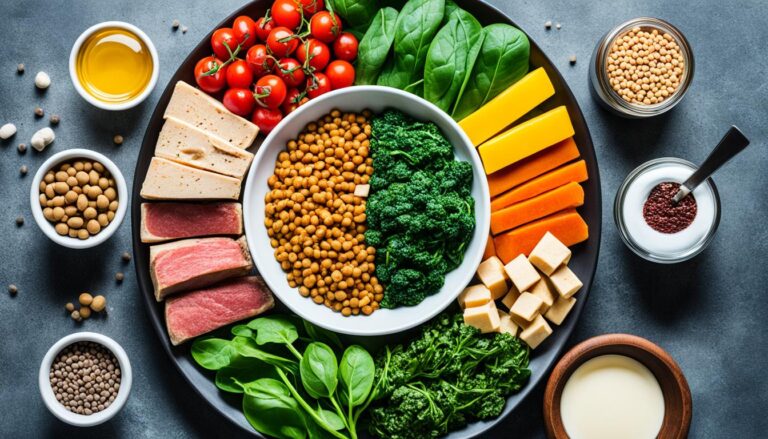Can you lose 15 pounds quickly and still stay healthy? For many, losing weight seems hard. But with the right mix of fitness and diet, it’s possible.
Norah Harts lost 15 pounds in three weeks by avoiding alcohol, eating less fast food, and drinking more water. Her story shows how simple changes can lead to big results.
It’s key to set realistic goals and eat well for weight loss success. Regular fitness and healthy choices help reach and keep weight loss goals. This way, you can lose weight and live a healthy life with methods that work over time.
Key Takeaways
- Losing 1 to 2 pounds per week is a safe and sustainable weight loss goal.
- Creating a balanced diet and incorporating regular fitness routines is essential for weight loss success.
- Understanding eating patterns and identifying emotional eating triggers can aid in weight loss.
- Getting adequate sleep and limiting alcohol intake are crucial for weight loss success.
- Incorporating portion control hacks and seeking healthier food alternatives can support weight loss efforts.
- Investing in nutrition education and considering counting macros can contribute to successful weight loss outcomes.
Understanding the Science Behind Fast Weight Loss
Fast weight loss comes from motivation a healthy lifestyle, and good nutrition. To lose weight, you need to burn more calories than you eat. This can happen by eating less or exercising more.
Metabolic processes like metabolism and thermogenesis are key in losing weight. Hormones like leptin and ghrelin control hunger and fullness. Knowing how these work can help you make a weight loss plan that fits you.
Caloric Deficit Fundamentals
A caloric deficit means burning more calories than you eat. You can do this by eating less or moving more. For example, a woman lost 15 pounds in three weeks by cutting alcohol, eating less fast food, and exercising more.
Metabolic Processes During Weight Loss
Metabolic processes like metabolism and thermogenesis are important for losing weight. These can be affected by diet, exercise, and sleep. For instance, eating from smaller plates can help you eat less, as people eat more from larger plates.
The Role of Hormones in Fat Burning
Hormones like leptin and ghrelin control hunger and fullness. Knowing how they work can help you make a weight loss plan that fits you. By staying motivated, living healthy, and eating right, you can lose weight fast and keep it off.

Mindful eating can also help you choose healthier foods. It means paying attention to what you eat and avoiding distractions. This can lead to a diet that supports a healthy lifestyle and fat loss.
| Weight Loss Method | Average Weight Loss |
|---|---|
| Intermittent Fasting | 7-11 pounds over 10 weeks |
| Continuous Calorie Restriction | No significant difference in weight loss |
How to Lose 15 Pounds Fastest Your Complete Strategy
To see a real transformation, you need to mix diet, exercise, and lifestyle changes. A low carb diet can help you lose weight fast. It lowers insulin and boosts fat burning. Lean proteins and veggies keep you full and stop you from eating too much.
Here are some tips to help you lose weight fast:
- Cut back on daily calorie intake by 500 calories to lose one pound a week
- Increase protein intake to boost metabolism and support weight loss
- Focus on whole, nutrient-dense foods and reduce processed foods and added sugars
Remember, losing weight is not just about losing weight fast. It’s about making lasting lifestyle changes. Aim to lose 0.5-2 pounds per week for a safe and healthy rate. With a solid plan and dedication, you can achieve a successful transformation and keep your weight off.

| Food Group | Recommended Daily Intake |
|---|---|
| Protein | 5-7 ounces |
| Vegetables | 2-5 cups |
| Healthy Oils | 22-44 grams |
Creating Your Optimal Weight Loss Meal Plan
For weight loss, a good meal plan is key. It should have a mix of protein, carbs, and healthy fats. Experts say eating fruits and veggies helps, and balancing macros is crucial.
Eating whole foods like lean meats, fish, and grains is also important. They give you the nutrients you need to lose weight.
Controlling portion sizes is vital in a weight loss meal plan. Eating too much can stop you from losing weight. Aim for a 250-500 calorie deficit each day.
To do this, focus on healthy foods and keep portion sizes in check. Here are some good choices:
- Lean proteins such as chicken and fish
- Whole grains such as brown rice and quinoa
- Healthy fats such as nuts and seeds
By adding these foods to your plan and watching your portions, you can help your weight loss. Aim to lose 1-2 pounds a week. Combining a healthy diet with exercise is key for lasting results and keeping muscle.

Essential Exercise Routines for Maximum Fat Burn
Regular exercise is key for losing weight. It burns calories and builds muscle. To burn fat well, mix aerobic exercises like running and cycling with strength training.
A good fitness plan can help you lose weight. For example, doing three workouts a week for eight weeks works. Include circuit training, strength training, and HIIT to burn calories and boost heart health.
Some great exercise routines for losing weight are:
- Brisk walking: burns about 7.6 calories per minute for a 140-pound person
- Jogging or running: burns about 10.8 calories per minute for a 140-pound person
- Cycling: burns about 6.4 calories per minute for a 140-pound person
- Swimming: burns about 9 calories per minute for a 140-pound person
To stay motivational, pick an exercise you like and can keep up with. The right mix of exercise and fitness routines helps you reach your weight loss goals and stay healthy.
Don’t try to lose weight too fast. Aim for 1-2 pounds a week for a healthy pace. With the right exercise and motivation, you can reach your goals and stay healthy.
| Exercise | Calories Burned per Minute |
|---|---|
| Brisk walking | 7.6 |
| Jogging or running | 10.8 |
| Cycling | 6.4 |
| Swimming | 9 |
Strategic Nutrition Timing for Enhanced Results
Nutrition is key for a healthy lifestyle and losing fat. Timing your meals right can boost your weight loss. Drinking water helps too, as it cuts hunger and speeds up metabolism.
Plan your meals well, including what to eat before and after working out. Also, think about how often you should eat.
Pre Workout Nutrition
It’s vital to eat before working out. It gives you energy and helps your muscles work better.
Post-Exercise Meal Planning
Eating after working out is important too. It helps your muscles recover and grow. Eating a mix of protein and carbs within an hour after exercise is best.
When it comes to
Optimal Meal Frequency
Eating 4-6 times a day can help with weight loss. It keeps you full and satisfied. By focusing on nutrition, you can lose fat and feel better.

- Eating a balanced meal or snack before exercise
- Consuming a mix of protein and carbohydrates after exercise
- Drinking plenty of water throughout the day
- Eating 4-6 meals per day to support weight loss
By following these tips, you can improve your weight loss. Focus on nutrition and a healthy lifestyle for a happier, healthier you.
| Nutrition Strategy | Benefits |
|---|---|
| Pre-Workout Nutrition | Provides energy and supports muscle function |
| Post-Exercise Meal Planning | Helps promote muscle recovery and growth |
| Optimal Meal Frequency | Supports weight loss by keeping you full and satisfied |
Lifestyle Modifications That Accelerate Weight Loss
Changing your lifestyle is key to losing weight and keeping it off. This means making smart choices every day. Getting enough sleep, managing stress, and staying active are all important.
Getting seven hours of sleep each night helps control hunger hormones. This is a big part of a healthy lifestyle. It’s also a big motivator for change.
Stress management, like meditation and yoga, lowers cortisol levels. This helps you relax and supports a healthy lifestyle. Small changes, like taking the stairs, can also boost your activity level. This helps improve your health and wellbeing.

Here are some tips to help you lose weight faster through lifestyle changes:
- Get enough sleep each night
- Practice stress management techniques
- Make daily habit adjustments to increase physical activity
By adding these lifestyle changes to your daily routine, you can boost your motivation for weight loss. This supports a healthy transformation.
| Lifestyle Modification | Benefits for Weight Loss |
|---|---|
| Getting enough sleep | Regulates hunger hormones, supports weight loss |
| Managing stress | Reduces cortisol levels, promotes relaxation |
| Increasing physical activity | Supports weight loss, improves overall health |
Common Weight Loss Obstacles and How to Overcome Them
Starting a weight loss journey can be tough. Obstacles like lack of motivation and emotional eating can slow you down. But, by facing these challenges, you can keep moving towards a healthy lifestyle.
Some common obstacles to weight loss include:
- Lack of motivation
- Emotional eating
- Poor eating habits
- Insufficient physical activity
To beat these obstacles, try finding a workout buddy or keeping a food diary. Also, getting help from a registered dietitian-nutritionist can be very helpful. Adding activities like swimming or aerobic training can also boost your motivation and help with weight loss.
By facing and solving common weight loss obstacles, you can stay on track with your healthy lifestyle goals. Remember, weight loss is a journey. Be patient, keep going, and always be kind to yourself.
| Obstacle | Solution |
|---|---|
| Lack of motivation | Find a workout buddy, set realistic goals |
| Emotional eating | Keep a food diary, seek support from a registered dietitian-nutritionist |
| Poor eating habits | Incorporate physical activity, eat a balanced diet |
Tracking Progress and Staying Motivated
Starting a weight loss journey takes commitment and hard work. To live a healthy life, it’s important to keep track of progress and stay motivated. Tools like mobile apps, progress photos, and celebrating small wins can help.
A healthy lifestyle is more than just a certain weight. It’s about making good habits that improve your overall health. Using apps like MyFitnessPal or Lose It! can help track calories and monitor progress. This gives valuable insights into your daily habits.
Progress photos are also a great motivator. Taking pictures regularly lets you see changes in your body and celebrate small wins. This is especially helpful when the scale doesn’t show progress, but you still feel like you’re getting better. Recognizing non-scale victories is also key. It helps you focus on achievements like more energy or better health, not just weight loss.
Best Practices for Staying Motivated
- Set realistic goals and celebrate small victories
- Find a support system, such as a friend or online community
- Focus on progress, not perfection
- Practice self-care and prioritize overall well-being
By using these strategies, you can build a healthy lifestyle and stay motivated. Remember, staying motivated is crucial for reaching and keeping a healthy weight. By tracking your progress and staying focused, you can achieve your goals.
Conclusion: Your Sustainable Path to Weight Loss Success
Losing weight is more than hitting a goal. It’s about building a lasting lifestyle that boosts your health and happiness. By using the tips from this article, you can make a weight loss plan that fits you perfectly. Always remember to celebrate your small wins, not just the big ones.
With time, effort, and the right mindset, you can hit your weight loss targets. Aim to lose 1 to 2 pounds 0.5 to 1 kilogram each week. This slow pace is safer and more effective than quick fixes.
Start with regular exercise, like 30 minutes of aerobic activity most days. Also, do strength training at least twice a week. Pair your workouts with smart nutrition choices and the right meal timing. These changes will help you lose weight and stay healthy for good.





